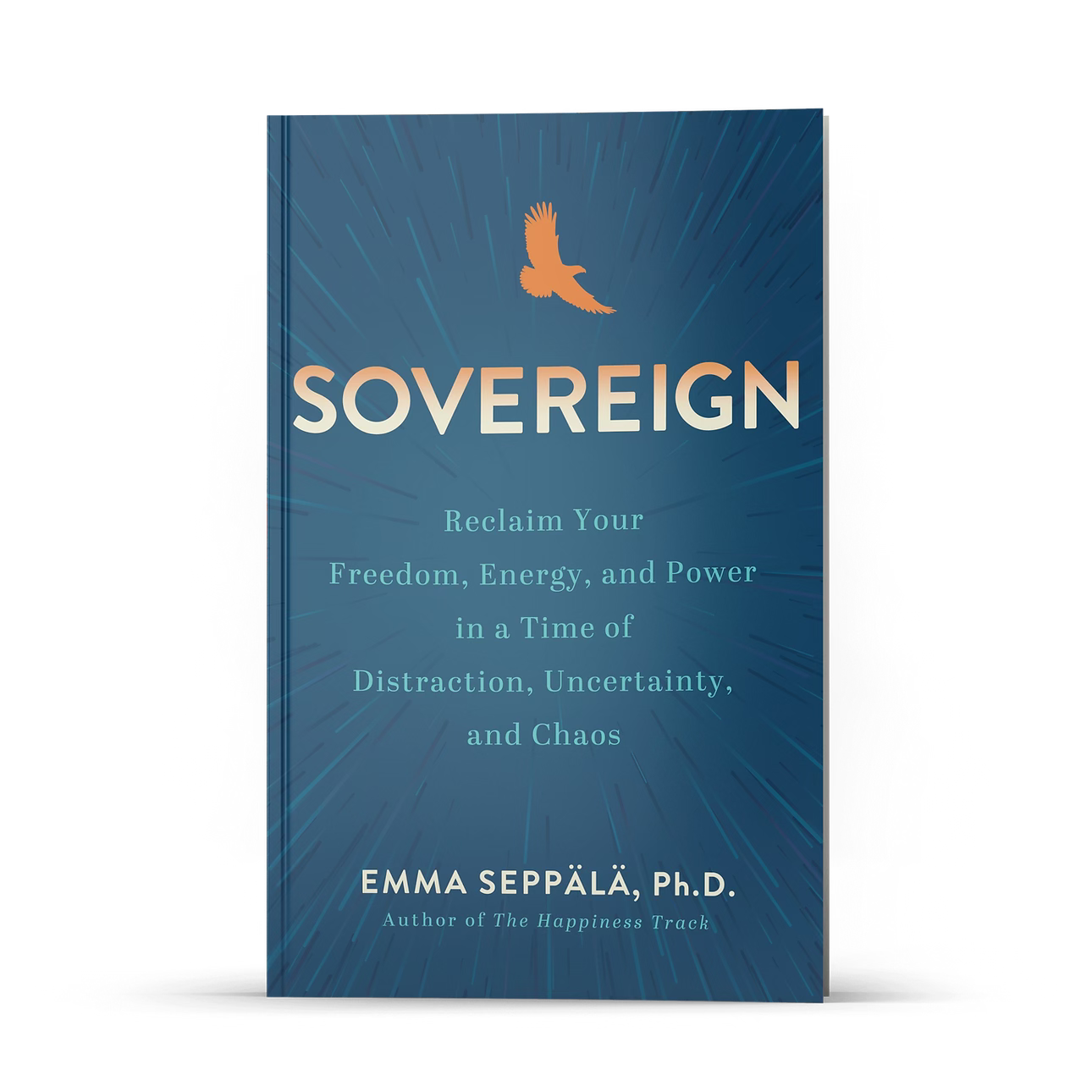"What if growing pains didn't end in your teens?"
What if they kept going so you could keep growing?

Dear You,
Today, I’m thrilled to share with you this excerpt from my friend Emma Seppala’s latest book, Sovereign: Reclaim Your Freedom, Energy and Power in a Time of Distraction, Uncertainty, and Chaos. Emma is a bestselling author, Yale lecturer, keynote speaker - and extraordinary human. A psychologist and research scientist by training, her expertise is the science of happiness, emotional intelligence, and social connection.
If you’ve ever wondered what emotional pain could possibly be good for — that’s Emma’s question, too.
Here’s Emma:
“After graduating from college, I lived in China for two years. There, I encountered profound wisdom from people who had been through hell and back and remained sovereign: Wise, happy & thriving.
What was their secret?
One particular gentleman had almost starved to death (there was general famine) and had lost his wife to those tragic times. He taught me a lot about resilience.
There is a Chinese expression
chi ku shi fu
which means eating bitterness (i.e., hardship) is good fortune.
Good fortune, i.e. it’s a good thing. That’s not how we tend to think in the West.
We believe the expression “no pain, no gain” applies only to exercise and diet.
It couldn’t possibly be true about our emotional pain: our anxiety, fear, insecurity, anger, frustration, loneliness, general malaise, midlife crisis, darkest thoughts, languishing, or anxiety.
Nope.
When it comes to those forms of pain, we do everything possible not to feel:
Shop or gamble, drink or binge, watch movies or porn, scroll or smoke, overwork or overexercise, over-indulge or punish ourselves.
This can look industrious (“I work 12-hour days”) or gritty (“I do an Ironman a month!”),or even saintly (“I volunteer 30 hours a week!”) . . . but it’s all the same thing:
Numbing.
And it keeps us bound.
Sadly, the pain is still there waiting for us. Only now we’re exhausted, beaten up by the side effects of our drug of choice, and, sadly, in worse shape to face it than when we started.
A sovereign approach looks different:
What if growing pains didn’t end in your teens?
What if they kept going so you could keep growing?
What if emotional pain was not useless suffering?
What if pain were your friend?
The friend who matures you, makes you stronger, fiercer, and wiser.
The friend that loves you so much they will break your heart so it can grow larger.
The friend that lures you into the darkest areas so you can see your own light shine brighter.
The friend that truly sees the beauty, strength, and magnificent potential you are.
And who will go to any length to help you birth your truest, bravest, boldest self?
Sovereign.
Looking back on your own life in this light, from what life experiences have your greatest lessons emerged?
Inevitably it’s the divorces, deaths, sudden unemployment, health issues, cheating partners, abusive relationships, or financial difficulties. It is those hard, painful, heartbreaking, and excruciating times that have also brought forth your best self.
They have invoked resilience in you because you had no choice.
They brought forth your courage because you had to make it through.
They cultivated forbearance and steadfastness in you because you felt like you were dying, but you had to keep going.
There were tears and moments spent writhing on the floor, but you got up, had breakfast, and went to work anyway.
You witnessed the warrior within yourself.
The valor.
And you carried on.
Your hair grayed, but you grew.
Post-traumatic growth is real. The lotus really does grow from the mud. When we go through hard times, it brings about forbearance and enormous strength. It brings about wisdom because we’ve seen suffering. We no longer take small things for granted.
Most of all, post-traumatic growth leads to compassion. Because you’ve seen and experienced pain, your heart has stretched. Its capacity for love is greater, and its desire to help others is stronger.
Always remember that you are sovereign.
You’re stronger than you know.”
~~~~~~
This was an excerpt from my extraordinary friend Emma Seppälä, a bestselling author, psychologist and Yale University research scientist and lecturer. You can order her book, SOVEREIGN, here! Or check out her book website and IG for more.
Have a wonderful weekend, and I’ll see you here again, this week.
xo Susan



I want to know at what point does the emotional growing pain becomes a mental health disorder like depression. Like how much pain should we endure , till we decide it's time to take it easy in life.
In India also we grow up with this thought , but now the younger generation is now learning from the west to take life a little easy - I mean not the part of advocating numbness or distractions ( although that is also becoming a part of our culture ), and of course there is some pain we cannot avoid , but the habit of deliberately putting ourselves in painful situations ( thinking we will gain from it ) has actually not helped us.
Also, Personally I think , being able to get out stronger out of a trauma or a painful situation comes in the hands of privileged people, not everyone is able to grow out of it.
But I can be wrong - and maybe I need to look at this from a different angle.
For some of us, "post traumatic" is by far the most frequently followed by "stress disorder".
I'm happy for those who made it through trauma stronger, but we should not only "rah rah" them: We should also remember those who just weren't able to withstand it w/o major psychological injury.